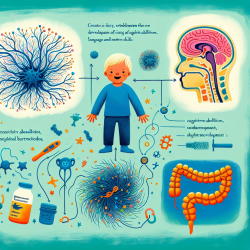Introduction
The integration of technology in healthcare has revolutionized the way institutions operate, particularly in the realm of medical record-keeping. The study titled Maintaining a medical institution in a context of materiality change: Lessons from a Canadian university hospital provides insightful findings on how institutional work and materiality interact to maintain and enhance healthcare practices. This blog post explores how practitioners, especially those involved in online therapy services like TinyEYE, can leverage these findings to improve their skills and outcomes for children.
Understanding Institutional Work and Materiality
Institutional work refers to the actions of individuals and organizations aimed at creating, maintaining, and disrupting institutions. The study highlights several forms of institutional work, including enabling, policing, and deterring, which are crucial in maintaining the institution of medical record-keeping amidst technological changes. Materiality, in this context, involves the role of physical elements, such as technology, in influencing institutional practices.
Key Findings and Implications for Practitioners
The research underscores the importance of intertwining institutional work with materiality to maintain and enhance healthcare practices. Here are some key takeaways for practitioners:
- Enabling: Create rules and structures that support the integration of new technologies. Practitioners should advocate for policies that facilitate the adoption of digital tools in therapy sessions.
- Policing: Ensure compliance with established norms through monitoring and evaluation. Regular audits and feedback mechanisms can help maintain high standards in online therapy practices.
- Deterring: Establish barriers to reverting to outdated practices. Encourage the consistent use of digital platforms to enhance the efficiency and effectiveness of therapy sessions.
- Routinizing: Integrate new practices into daily routines. Practitioners should focus on embedding digital tools into their regular workflow to improve therapy outcomes.
Encouraging Further Research
The study calls for more empirical research to understand the role of materiality in institutional work. Practitioners are encouraged to engage in research activities to explore how digital tools can be better integrated into therapy practices. Collaboration with academic institutions can provide valuable insights and drive innovation in the field.
Conclusion
By understanding and implementing the findings from the study, practitioners can enhance their skills and improve outcomes for children in online therapy settings. Embracing institutional work and materiality can lead to more effective and efficient therapy practices, ultimately benefiting the children we serve.
To read the original research paper, please follow this link: Maintaining a medical institution in a context of materiality change: Lessons from a Canadian university hospital.










